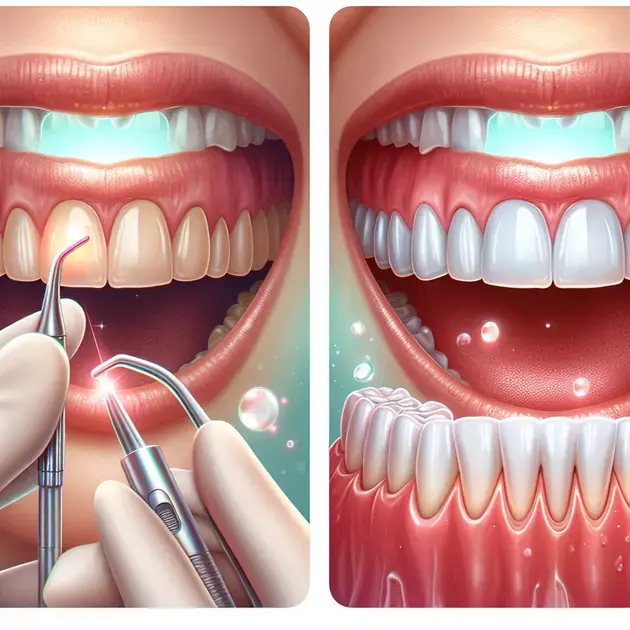Are you struggling to find effective medication for periodontitis? Look no further, as this ultimate guide will provide you with all the information you need to combat this common dental issue.
Periodontitis is a serious condition that affects the gums and can lead to tooth loss if left untreated. In this guide, we will explore the most effective medications available to help you manage and treat periodontitis effectively.

Effective Medication for Periodontitis: An Overview
Periodontitis is a serious gum infection that damages the soft tissue and destroys the bone that supports your teeth. To effectively treat periodontitis, medications are often prescribed in conjunction with other dental treatments. Common medications used for periodontitis include antibiotics, antimicrobial mouthwashes, and enzyme suppressants.
One popular medication for periodontitis is doxycycline, which is available in pill form or as a gel that can be applied directly to the gums. This medication works by inhibiting the production of enzymes that break down gum tissue. Another effective medication is chlorhexidine, a powerful antimicrobial mouthwash that can reduce the amount of bacteria in the mouth.
When choosing a medication for periodontitis, it is important to consult with your dentist or periodontist to determine the best course of treatment for your specific condition. They will consider factors such as the severity of your periodontitis, any underlying health conditions, and your medical history.
You can find more information about effective medications for periodontitis on reputable dental websites such as the American Academy of Periodontology website. They provide in-depth guides on different medications, their benefits, potential side effects, and how to use them properly for optimal results.
Understanding Periodontitis Medications
Periodontitis medications work in various ways to combat gum infections and promote gum health. Antibiotics such as amoxicillin and metronidazole are commonly prescribed to fight off bacterial infections in the gums. These antibiotics help reduce inflammation and control the growth of harmful bacteria.
In addition to antibiotics, antimicrobial mouthwashes like Listerine can be used to reduce plaque and bacteria in the mouth. These mouthwashes contain ingredients that target and kill bacteria that cause gum disease. Using an antimicrobial mouthwash as part of your daily oral hygiene routine can help prevent the progression of periodontitis.
To understand periodontitis medications better, it is recommended to read scientific articles and research papers on the subject. Websites like PubMed offer a vast collection of studies on periodontitis medications, their effectiveness, and the latest developments in the field. By staying informed, you can make well-informed decisions about your periodontitis treatment plan.
Discussing periodontitis medications with your dental healthcare provider is crucial to ensure you are receiving the most appropriate treatment for your condition. They can assess your oral health, discuss the benefits and side effects of different medications, and tailor a treatment plan that meets your specific needs.
Tips for Choosing the Right Medication
When selecting a medication for periodontitis, there are several factors to consider to ensure you are choosing the right one for your condition. Start by consulting with your dentist or periodontist to get a professional evaluation of your oral health and the severity of your periodontitis.
Consider any allergies or sensitivities you may have to certain medications. It is essential to inform your healthcare provider about any allergies or adverse reactions you have had in the past to prevent complications during treatment.
Research different medications available for periodontitis and their respective benefits and side effects. Websites like WebMD provide comprehensive information on various medications used for gum diseases, helping you make an informed decision.
Follow your prescribed medication regimen diligently and attend regular check-ups with your dentist to monitor the progress of your periodontal treatment. Your dentist may adjust your medication or treatment plan based on your response to the medication and the condition of your gums.

Understanding the Role of Medications in Periodontitis Treatment
Periodontitis is a serious gum infection that can lead to tooth loss if left untreated. Medications play a crucial role in the treatment of periodontitis, as they help control the infection and reduce inflammation in the gums. Antibiotics are commonly prescribed to combat the bacteria causing the infection, while antimicrobial mouth rinses can help reduce the plaque buildup that contributes to periodontitis.
It is important for patients to follow their dentist’s recommendations when taking medications for periodontitis. This may include taking the full course of antibiotics as prescribed and using mouth rinses as directed. Failure to adhere to the medication regimen can lead to a worsening of the infection and may necessitate more aggressive treatment options.
Some medications used in the treatment of periodontitis may have side effects, so it is essential for patients to communicate any adverse reactions to their dentist. Adjustments to the medication can often be made to mitigate side effects while still effectively treating the infection.
In addition to prescribed medications, patients can also support their periodontitis treatment through good oral hygiene practices. Regular brushing, flossing, and dental cleanings can help control the infection and prevent it from progressing further.
Overall, medications play a crucial role in the comprehensive treatment of periodontitis and should be used in conjunction with a thorough oral hygiene routine to achieve optimal results.
How Lifestyle Choices Affect Periodontitis Medications
The medications prescribed for the treatment of periodontitis can be influenced by an individual’s lifestyle choices. Factors such as smoking, poor diet, and stress can impact the effectiveness of medications in combating the infection and promoting gum health.
Smoking, for example, is known to impair the body’s immune response and can make it more difficult for medications to control the bacterial infection in the gums. Patients who smoke may require higher doses of antibiotics or longer treatment periods to achieve the same results as non-smokers.
A diet high in sugar and processed foods can also contribute to the progression of periodontitis, as it provides an ideal environment for bacteria to thrive. Medications may be less effective in patients with poor dietary habits, as the underlying cause of the infection is not being addressed.
Stress is another factor that can impact the effectiveness of periodontitis medications. Chronic stress can weaken the immune system and make it harder for the body to fight off infections. Patients under high levels of stress may require additional support, such as relaxation techniques or counseling, to enhance the effects of their medications.
By addressing lifestyle factors that can affect periodontitis medications, patients can improve the outcomes of their treatment and support long-term gum health. Making positive changes in habits such as quitting smoking, eating a balanced diet, and managing stress can enhance the effectiveness of medications and promote overall wellness.
The Importance of Regular Dental Check-ups
Regular dental check-ups are essential for the prevention and early detection of periodontitis, a serious gum infection that can lead to tooth loss if left untreated. During a dental check-up, the dentist will examine the gums for signs of inflammation, bleeding, or recession, which are early indicators of periodontal disease.
Early detection of periodontitis allows for prompt treatment to prevent further damage to the gums and bone supporting the teeth. In the early stages, periodontitis can often be managed with non-surgical treatments such as scaling and root planing, which remove plaque and tartar buildup from the teeth and gums.
In addition to examining the gums, regular dental check-ups also include a thorough cleaning to remove plaque and tartar that cannot be eliminated with regular brushing and flossing. Professional cleanings help prevent the formation of periodontal pockets where bacteria can thrive and cause infection.
Regular dental check-ups also provide an opportunity for patients to discuss any concerns they may have about their oral health and receive guidance on maintaining good oral hygiene practices at home. Dentists can offer personalized recommendations for oral care products and techniques to help patients prevent periodontitis and other dental issues.
Overall, regular dental check-ups play a crucial role in the prevention and management of periodontitis, allowing for early intervention and personalized care to support optimal gum health and overall well-being.
Conclusion
In conclusion, medications play a vital role in the treatment of periodontitis by controlling infections and reducing gum inflammation. Patients must follow their dentist’s recommendations closely, including completing antibiotic courses and using mouth rinses as directed, to avoid worsening infections. It’s crucial to communicate any medication side effects to make necessary adjustments while maintaining effective treatment.
Lifestyle choices significantly impact the effectiveness of periodontitis medications. Factors like smoking, poor diet, and stress can hinder the treatment process. Addressing these factors through positive changes such as quitting smoking, adopting a balanced diet, and managing stress can enhance medication effectiveness, ultimately promoting long-term gum health.
Regular dental check-ups are essential for preventing and detecting periodontitis early. These check-ups allow dentists to identify signs of inflammation or recession, enabling prompt treatment to prevent further gum and bone damage. They also provide an opportunity for personalized oral care guidance, ensuring optimal gum health and overall well-being.



